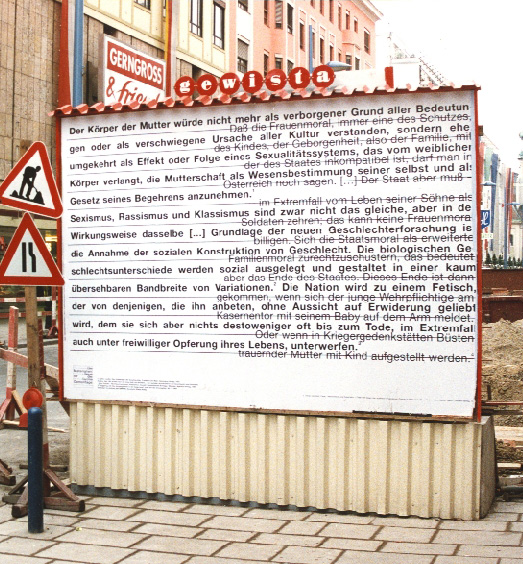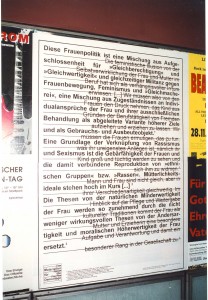Bill poster series, Vienna
In cooperation with Oliver Ressler
In November 1995, “The New Right – Materials for the Dismantling”/”Die Neue Rechte – Materialien für die Demontage” three kinds of sixteen-part posters were presented at thirty-six locations in Vienna. As of mid-November, thirteen smaller-format posters of “The New Right – Materials for the Dismantling” were also placed at various underground stations (mainly the line U2) for four weeks.
The starting point for the project was the publication of “Die selbstbewußte Nation”/”The Self Confident Nation” by the Ullstein-Verlag in 1994. In this book, conservative nationalist authors attempt to establish the concept of the “new right” and spread the new right school of thought.
The new right’s ideological arguments find a network for interaction in publishing houses, magazines, institutions and joint book publications. Disguised under the cloak of cultural or gender difference, racism in new right publications is particularly dangerous due to its acceptance among a variety of social classes. In its efforts to establish cultural hegemony, the new right was able to move far into the conservative realm not only by providing key words for the political discourse, but also by establishing a dimension of (socially constructed) reality, which, in the mean time, is accepted as unquestioned reality in broad social groups.
The poster series attempts to point out racism in the structures of the new right’s identifications and their meanings. For this purpose, new right quotations containing clear formulations are confronted with critical text passages specifically chosen because their content deals with these positions. These lines of text are underlined to emphasize the necessity of standpoints opposing the new right and further to create a line which thwarts the strategically veiled rhetoric of the new right.
The posters were placed at various sites along the subway system, at bus stops and other locations that are passé by many people to enable reading of the posters and confrontation with their content.

One of the three 16-sheet posters
Translation: The body of the mother is no longer understood as the latent ground for all meaning or as the secret source of all culture. Rather the opposite, it is an effect or result of a system of sexuality that demands that the female body accept motherhood as the essential determination of self and desirable law.(1)
Sexism, racism and classism are certainly not the same thing but in their methods the same […]. The basis for the new gender research is the acceptance of the social construction of gender. Biological gender differences are interpreted and designed socially and formed into a range of variations on an obvious theme.(2)
The nation has become a fetish worshiped by those who love without the prospect of response and who still subordinate themselves, often until death and in extreme cases even by voluntarily sacrificing their lives.(3)
In Austria one can still say that women’s morals which are always based on protection, on the child, on security and on the family are incompatible with the morals of the state. […] In extreme cases the state must, be carried by the lives of its sons as soldiers. No women’s morals can achieve that. To mix up state morals as expanded family morals, would, however, mean the end of the state. We know the end has come when the young conscript registers at the barracks gate with his baby on his arm. Or when busts of mourning women with their child are erected at war memorials.(4)
(1) Butler, Judith. Das Unbehagen der Geschlechter. Frankfurt am Main: Suhrkamp Verlag, 1991.
(2) Lenz, Ilse. Wir wollen sein ein einig Volk von Brüdern… Zur sozialen Konstruktion von Volk und Ethnizität. in: Frauen – Rechtsextremismus, Rassismus, Gewalt: Feministische Beiträge. Münster: Agenda-Verlag, 1994.
(3) Wuggenig, Ulf. Die Vergangenheit in der Gegenwart. in: Vor der Information, No. 1, 1994.
(4) Meier-Bergfeld, Peter. Deutschland und Österreich – Über das Hissen der schwarz-rot-goldenen Flagge in Wien. in: Die selbstbewußte Nation. Berlin: Ullstein Verlag, 1994.
One of the 8-sheet posters at Viennese underground stations
Translation: The body of the mother is no longer understood as the latent ground for all meaning or as the secret source of all culture. Rather the opposite, it is an effect or result of a system of sexuality that demands that the female body accepts motherhood as the essential determination of self and desirable law.(1)
Sexism, racism and classism are certainly not the same thing but in their methods the same […]. The basis for the new gender research is the acceptance of the social construction of gender. Biological gender differences are interpreted and designed socially and formed into a range of variations on an obvious theme.(2)
The nation has become a fetish worshiped by those who love without the prospect of response and who still subordinate themselves, often until death and in extreme cases even by voluntarily sacrificing their lives.(3)
The feminist illusion of self- realization of woman and mother in a career has been shown to be a fatal error. […] We have to put an end to pressuring women into allowing others to raise and educate their children because of their own careers. We have to encourage women to do that which is their most natural concern, namely, to see their child grow up and become competent – and to be devoted to it.(4)
Man and woman are not the same, but in their difference they are equal. Women, as mothers and teachers, are assigned a special social position with respect to the care and passing on of cultural traditions.(5)
(1) Jensen, Mechthild, Täterin, Zuarbeiterin, Opfer, in: Frauen – Rechtsextremismus, Rassismus, Gewalt: Feministische Beiträge. Münster: Agenda-Verlag, 1994.
(2) Gabriele Fuchs. Rassismus und Sexismus – ein gewaltiges Paar. in: Interkulturelles Zusammenleben – aber wie? Innsbruck: Österreichischer Studienverlag, 1994.
(3) Eichhorn, Cornelia; Grimm, Sabine. preface. in: Gender Killer. Texte zu Feminismus und Politik. Berlin, Amsterdam: ID-Archiv, 1994.
(4) Haider, Jörg. Die Freiheit, die ich meine. Frankfurt am Main – Berlin, Ullstein Verlag, 1993
(5) Der freiheitliche Werkskatalog in: Aula No. 9, 1994.
